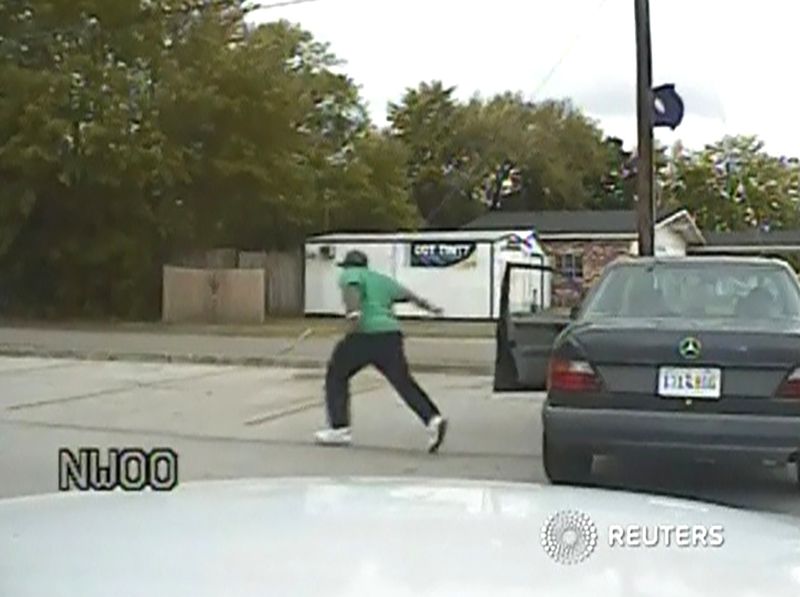By Harriet McLeod
NORTH CHARLESTON, S.C. (Reuters) - A video captured by a South Carolina police cruiser's dashboard camera surfaced on Thursday showing a black man fleeing after what appears to be a routine traffic stop by a white officer who would eventually pursue and fatally shoot him in the back.
The footage, released by the South Carolina Law Enforcement Division (SLED) and aired by CNN, was taken minutes before a bystander's video recorded North Charleston Patrolman Michael Slager gunning down 50-year-old Walter Scott as he ran. The video of the shooting on Saturday led to Slager's arrest on a murder charge and dismissal from his job.
The shooting was reminiscent of other police killings over the past year in cities including New York; Ferguson, Missouri, and Cleveland, Ohio, rekindling national outrage over excessive use of force by law enforcement against black men.
The new video clip, which lasts just four minutes, shows Slager, 33, approaching a black Mercedes-Benz and asking the driver, Scott, for his license and proof of insurance. In an even, professional voice, he tells Scott he was pulled over a broken tail light. A passenger is also seen sitting in the car.
The driver and officer have a brief exchange that's inaudible, and the officer returns to his patrol car. After about two minutes, Scott gets out of the Mercedes car and signals to the officer, who says: "You got to stay in the car."
Scott gets back into the vehicle and then about 20 seconds later, he emerges again and takes off running.
After the shooting, Slager said he had fired his weapon because Scott had taken his stun gun and he feared for his life. The second video offers no evidence of the officer's claim, although there are a gap between the two clips.
In the footage of the bystander, Scott does not appear armed at any point, and neither video shows any physical confrontation between the men.
Thom Berry, a SLED spokesman, said there were other videos taken when other responding officers arrived at the scene, but none of them contained the shooting or its aftermath.
Earlier on Thursday, civil rights leaders urged the South Carolina legislature to "stop dragging its feet" on a bill that would require all officers to wear cameras on their uniforms, echoing earlier calls by the White House.
"It will lessen the chance that any more black men will be used for target practice as Mr. Scott was," said Dot Scott, president of the Charleston chapter of the National Association for the Advancement of Colored People.
After Walter Scott fled, the new video shows the male passenger being frisked and then led away by another officer who arrived at the scene. It was not clear what the passenger witnessed or whether he remains in police custody.
Chris Stewart, a lawyer for the Scott family, told CNN the passenger was a coworker of Scott but did not provide his name.
Slager has retained prominent Charleston lawyer Andy Savage to defend him, court records show. Savage's previous clients included convicted al Qaeda operative Ali al-Marri.
"As we focus in on the facts, we will probably have more to say, but it is far too early for us to be saying what we think," Savage said in a statement.
No one answered a knock at Slager's home on Thursday in the neighboring city of Hanahan. One neighbor said Slager and his wife, who is eight months pregnant, had only recently moved into the tidy house with wisteria blooming out front.
The now-dismissed officer's mother, Karen Sharpe, told ABC News that she had not viewed the video showing him gunning down Scott, saying it was too painful to watch.
With her voice choking, she expressed sympathy for the Scott family. "Their life will never be the same again and my life will never be the same again," she said.
The funeral for Scott, a father of four who had a history of arrests for failing to pay child support, will be held on Saturday in Summerville, his family said.
Hours before the second video was aired, another South Carolina man emerged to say that Scott's shooting vindicated his own complaint of abuse against Slager nearly two years ago that was dismissed after a brief investigation.
"If they had really listened to me and investigated, then that man would probably have been alive because he wouldn't be an officer in the field," Mario Givens said at a press conference with his lawyer, who said his client planned a lawsuit over the September 2013 case.
